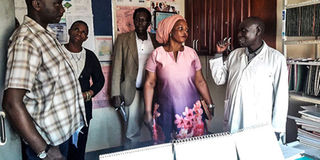Yumbe health centres face staff challenges, say MPs

Inspection. Members of Parliament on the committee on HIV/Aids and the officer-in-charge of Barakala Health Centre lll, Mr Pontius Amatre (right), during the inspection on March 14. PHOTO BY ROBERT ELEMA
What you need to know:
Issue. Members of the Parliamentary Committee on HIV/Aids say some facilities cannot handle the overwhelming number of patients.
Members of Parliament have observed that health centres in Yumbe District are severely understaffed which has resulted in heavy workload forcing many to seek greener pastures outside the country.
During a visit to various health centres in the area on Saturday, members of the Parliamentary Committee on HIV/Aids noted that health workers work overtime and cannot perform adequately because of the increasing population of South Sudan refugees.
The MPs, who were on a fact -finding mission of the status of health centres in the district, said some facilities cannot handle the overwhelming number of patients.
The committee toured Barakala Health Centre III and Bidibidi Health Centre III, both government facilities.
Mr Pontius Amatre, the officer-in-charge of Barakala Health Centre III, said the facility that was established in 1968 has a catchment population of more than 30,000.
“We only have seven government staff against 19, which is the required number for health centre III facility. We are lucky to receive support from some partners such as IRC and UNICEF who deployed some staff because of the influx of the refugees,” he said.
Mr Amatre said the partners provided them three staff and got the other two from the sub-county making it a total of 12 staff at the facility.
Mr Bonny Okello, the MP for Kole North, said there are many implementing and operating partners in Yumbe but they are not recruiting health workers.
“According to your ambitious plan, you intend to upgrade Barakala Health Centre III to health centre lV but the staffing level for health centre III is not enough. What’s the problem? Are you not recruiting or you are not prioritising in health?” he asked.
“In some places, the politicians would prefer that they recruit more parish chiefs but they don’t want to recruit nurses and midwives. I want to understand the situation here because you have many health facilities supported by partners,” he added.
The Yumbe District health officer, Dr Alfred Yayi, said the overall health staffing level is 65 per cent.
“We have limited wage bill that constraints us from recruiting health workers. We only recruit when there is availability of wage to pay salaries,” he said.
“In 2016, Ministry of Health upgraded two of our health centre IIs to health centre IIIs and one health centre III to health centre IV. The upgrading was done on paper but not the wage to fill the staffing gaps,” Mr Yayi added.
He explained that the recommended staffing is two midwives for health centre IIIs and three midwives for health centre IVs but said its impossible because they have so many programmes that have come on board.
Yellow fever
Meanwhile the Ministry of Health has planned to conduct massive yellow fever vaccination exercise in Moyo and Maracha districts after receiving vaccines from International Coordination Group that manages global stockpiles of yellow fever and meningitis.
Dr Joyce Moriku Kaducu, the Minister of State for Primary Health care, also the Moyo Woman MP, on Monday said: “The vaccines have finally arrived in the country and vaccination will commence in Moyo, Yumbe, Koboko, Maracha and Buliisa districts. We have received a total of 10,600 dozes of the vaccines.”
In January, there were two confirmed cases of yellow fever in Moyo District of both males aged 18 and 21 years. The duo were timber traders.
They were admitted to Logoba Health Centre III before being referred to Moyo General Hospital.
Dr Franklin Iddi, the Moyo District health officer, said it would be better if the Ministry of Health included the yellow fever vaccination into the routine immunisation schedule.


